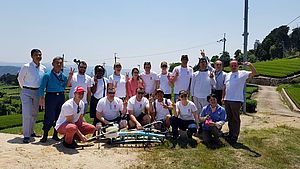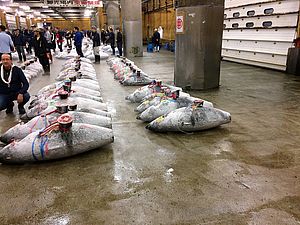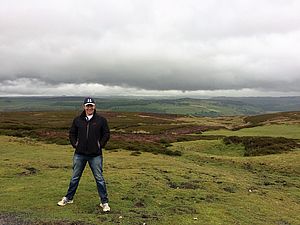David Kidd, 2017 Nuffield Scholar
As part of my Global Focus Programme, I was fortunate enough to join scholars from Australia, Ireland, Northern Ireland, England, the Netherlands and Brazil on a six-and-a-half-week tour of Singapore, Indonesia, Japan, Israel, England and the US.
The result of such an intense tour is a greater understanding of the global trends in agriculture and the part that agriculture plays in societies around the world.
Throughout the course of the tour, we were hosted by ‘in-country’ hosts who worked to provide us with a broad and valuable range of experiences. These experiences included but were not limited to visits to the Indonesian Puppet Museum in Batavia, Jakarta, a Buddhist monastery in Japan, Jerusalem in Israel on a Jewish holy holiday, York Minster Cathedral in England, and a series of monuments and buildings in Washington DC.
These visits gave not only a high level of appreciation of the culture and history of the people/places visited, but also assisted in providing an introduction and background to the various business visits completed in each location.
Singapore
Singapore is a melting pot of Eastern and Western culture, reflecting its history of formerly being a British colony in Asia and now a key port for trade between the East and the West.
Singapore has a GDP in-excess of $300bn USD which is impressive given it is only 130sq km in size. It is the 4th largest hub in the world for energy trading and the 2nd largest for metals and agriculture.
It is a finance hub, with over 200 banks financing shipments of vast volumes of agricultural products, some of which will never touch the ground in Singapore. Due to it being regarded highly for low levels of corruption, it is used as a major trading hub for agricultural products into Asia, particularly into China.
Singapore constantly seeks to add value to services and products to generate further returns including processing fresh food into finished product to add value.
Locally, it services a high net-worth population with a trip to a local supermarket showing almost exclusively imported products. All food is labelled by country of origin, with premium produce sold at high margins. It was particularly noticeable that some companies proudly branded which country their product came from and extolled its virtues.
NZ products however were generally not as well marketed or branded. Our products did not appear to ‘leap out’ from the supermarket shelf in the way other countries/companies branding had achieved.
Indonesia
Indonesia provided me with new insights into the politics of agriculture, a theme which continued during our tour in Japan. The agricultural industry is heavily regulated in Indonesia.
Current government policy is targeted towards Indonesia being self-sufficient with food production, although with a growing economy and more money to spend on food, this is unlikely to be achieved.
Whilst the government regularly reviews and changes policies and procedures to limit supply or cap market prices where they can, there continues to be a significant amount of imported food products.
For example, the retail price of beef is controlled by the government to assist in ensuring that people can afford to buy meat. Indonesia currently consumes around 730,000t/annum or approximately 2.8kg beef/capita/annum.
A proportion of beef is imported live from Australia under very strict conditions (due to a scandal around the slaughter of animals in the 2011). Due to the price of animals currently rising (alongside relatively high global beef prices), Indonesia has been importing less live beef cattle from Australia, and instead importing buffalo from India.
They are also looking to ship live cattle from Mexico due to this option being slightly more cost effective than equivalent Australian animals.
Government policy also dictates that the Indonesian beef industry must import 20% of the live animals as breeding cattle (in-calf cows), in an attempt to build their own herd.
Japan
Japan was an absolute highlight of this trip. Our group was lucky enough to view a wide and varying range of businesses from the Kobe beef auction to a wagyu beef farm, green tea plantations and processing facilities, a dairy and ice cream business, small horticultural businesses selling high end produce, and even a popcorn farmer selling his own product in microwave popcorn bags!
The Japanese people are very polite with long established business structures and an extremely formal manner in which they conduct business.
Farmers are held in a very high regard as they are perceived as the people responsible for feeding the nation. Consumers will typically pay 20-25% more to purchase Japanese product over similar imported products.
Farms tend to be quite small (average around 2ha) with vast subsidies paid to keep the sector profitable (these subsidies total more than the GDP generated by the sector). In agriculture, most of the farming inputs and outputs are controlled by a business called ‘JA’, a government established, farmer controlled monopoly.
JA has huge control over the sector and is averse to any change in subsidies or reduction in tariffs on imported food. Despite this, the Japanese Government is starting to try and change the sector with a view to loosening the trade barriers and allowing more imported food into Japan, a real opportunity for NZ.
Japan has a major issue with ageing farmers now retiring from farming, with not a lot of young people looking to enter the industry.
The average age of farmers is approximately 67, with some farmers we spoke to being unsure regarding who would farm their land following their retirement.
In order to bolster the sector, a program has been developed to allow some foreign workers (particularly from China) to assist with working the land.
Israel
The Israeli people are incredibly resourceful, innovative and world leading in some of the technology they use to generate agricultural production from what is generally a very harsh environment.
We travelled extensively through Israel, looking at research institutes and farming operations to gain an understanding of some of the technology used to cope with the challenges they face. Due to the climatic conditions, all livestock are housed in sheds and open side barns, with the result being very intensive operations that must be efficient to be profitable.
Water usage is a major concern with most recycled water used to irrigate high value crops with large amounts of desalinated water used due to the lack of fresh water availability.
Of particular note, was the fact that some of the water being used for irrigation of crops contained high levels of dissolved salts, making the salinity of the water higher than would otherwise be expected in a horticultural environment.
Despite this, they are still managing to harvest above average yields, a feat that impressed the horticultural farmers on our tour.
Israel is well known for its kibbutz arrangements (groups of families that live and work in a semi-socialist structure where the community rather than individual people own and operate the assets for the benefit of all).
However, they are not averse to the change in society, with many kibbutz members now becoming older and a number beginning to struggle with succession issues.
Agriculture is not viewed with the priority it once was and large numbers of young people are focussing on entering technology industries, with less choosing to work within agriculture. However, we did see some interesting technology being used within agriculture from milk meters in a dairy shed (that split high value milk from low value milk at the cluster) to Bio Bee (a business where bumble bees are grown in boxes to develop colonies which can then be sold to horticultural businesses for pollination of crops).
England – The Triennial
The Triennial was an amazing opportunity to catch-up with not only the other groups who were also travelling on their GFPs, but also to meet and interact with a range of scholars from all countries and years.
They provided a fascinating insight into the Nuffield Scholarship and the opportunities and discussions that have resulted following completion of their scholarship programmes.
Although several impressive businesses were viewed, many of which were using new technology to improve their profitability, sustainability and environmental impact, discussion was very much influenced by the upcoming BREXIT and what this will potentially mean for these businesses.
Some appear to be embracing the opportunity, while others were quite apprehensive about the challenge of competing against lower cost or more efficient operators from other parts of the world (NZ very much included).
There was considerable discussion regarding the potential for subsidies in farming to be reduced or removed, and NZ was discussed at length as a model as to how this could work. Many of the businesses that we were shown relied heavily upon manual labour which invariably came from Eastern Europe, a challenge that the UK government will face as they work through discussions with the EU.
Some of the businesses that we were fortunate enough to visit really focused on two key points of interest, the first being the provenance of the food they were selling and ensuring the quality of that produce.
Consumers are becoming increasingly focussed on the ‘story’ of their food. They want to know how it has been made, where it comes from and what makes it unique.
We cannot underestimate the importance of this, however any ‘story’ must be supported by a strong and secure supply chain that backs the integrity of claims on the packaging.
I was also struck by the high importance of consistent quality and the impact of this quality on the price that is received. At Hall Hunter Partnership, the managing director Harry Hall was only interested in supplying berries of ‘A’ quality. Berries that did not meet ‘A’ quality standards were discarded regardless of any income that could be received from them.
Together with his level of supply, this meant he had the ability to engage in meaningful discussions with his in-market partners (Waitrose and Marks & Spencer) when it came to Marketing his products and achieving the highest possible price (and therefore the best return on his assets).
USA: Washington D.C and Wisconsin
The chance to visit Washington, D.C. was an absolute highlight. The number of historic events that have occurred in this city and the influence that it continues to have on world affairs is immense.
The impact of decisions made here can have a significant impact on NZ agriculture (for example, the withdrawal from TPP by President Trump).
However, with the slow process of appointing his Secretary for Agriculture and the fact that the rest of the agriculture cabinet is yet to be appointed, it swiftly became apparent that President Trump does not have a major focus on the agriculture sector.
Despite this, agriculture remains well supported in the US with a vast network of universities across the country being primarily set up to support agricultural research.
Wisconsin is typically known as a ‘dairy state’ (due to the large number of dairy farms in the area) although they differ significantly from NZ in that they are largely indoor based systems with high volumes of crops grown to feed the stock.
There were a range of automated and traditional parlour based systems, however with access to labour becoming a significant issue there is likely a trend towards automated parlours to reduce labour requirements.
There is a focus on environmental impacts, with strict controls on the spreading of animal waste and some quite innovative farmers who are trialling different grazing systems with the aim of reducing their impact on the environment.
Key trends and how they relate to NZ
A few key trends and insights I observed/developed during the course of the GFP have been summarised below:
Provenance is of major interest to consumers
The most successful businesses and farmers that we engaged with on our travels make it a priority to constantly talk to their consumers about what is happening within their business, and the impact that this will have on production and when consumers will be able to purchase their products.
An example was a high-end vegetable producer in Japan who sold all his produce on-line and had a huge twitter following. He was consistently updating consumers with information about what was fresh and new, when products would be available, and keeping them updated with photos of his products. The more we interact, the better the consumer understands our business and the ‘story’ behind our produce.
Quality and traceability is incredibly important
Consumers are becoming more and more interested in understanding the production story and exactly what that story entails. People understand the “organic” story and are prepared to pay for it.
If we are to maximise the value of our product, we need to also demonstrate that we are being incredibly efficient with what we use to produce it and why it is necessary.
It is also incredibly important to ensure that the quality of product is maintained at a high level, and that we are consistent in our interactions.
Constant innovation is key
The product created and sold today will not necessarily be what the consumer desires tomorrow.
The horticultural businesses visited were constantly exploring new varieties and innovations to present to the consumer. The technology implemented in Israel to reduce cost by separating milk at the cluster rather than at the factory will also assist in improving returns to the farmer in the long term.
Succession in agriculture is a global issue
Every country visited was experiencing difficulties with succession planning and encouraging young people to enter the agricultural industry.
Attracting and retaining talent in the industry is a key issue, with land in some countries no longer being farmed due to nobody being interested in taking on the responsibility of such a venture.
Increasing the interaction between urban people and rural businesses will not only improve the understanding of the issues that we face in this area, but also maximise the potential future ‘talent pool’ of people available and willing to enter the industry in the longer term.
I would like to take the opportunity to thank the NZ Nuffield Trust and all the sponsors including AGMARDT, Beef and Lamb NZ, Dairy NZ and FMG for the opportunity to engage in this incredible journey.




























